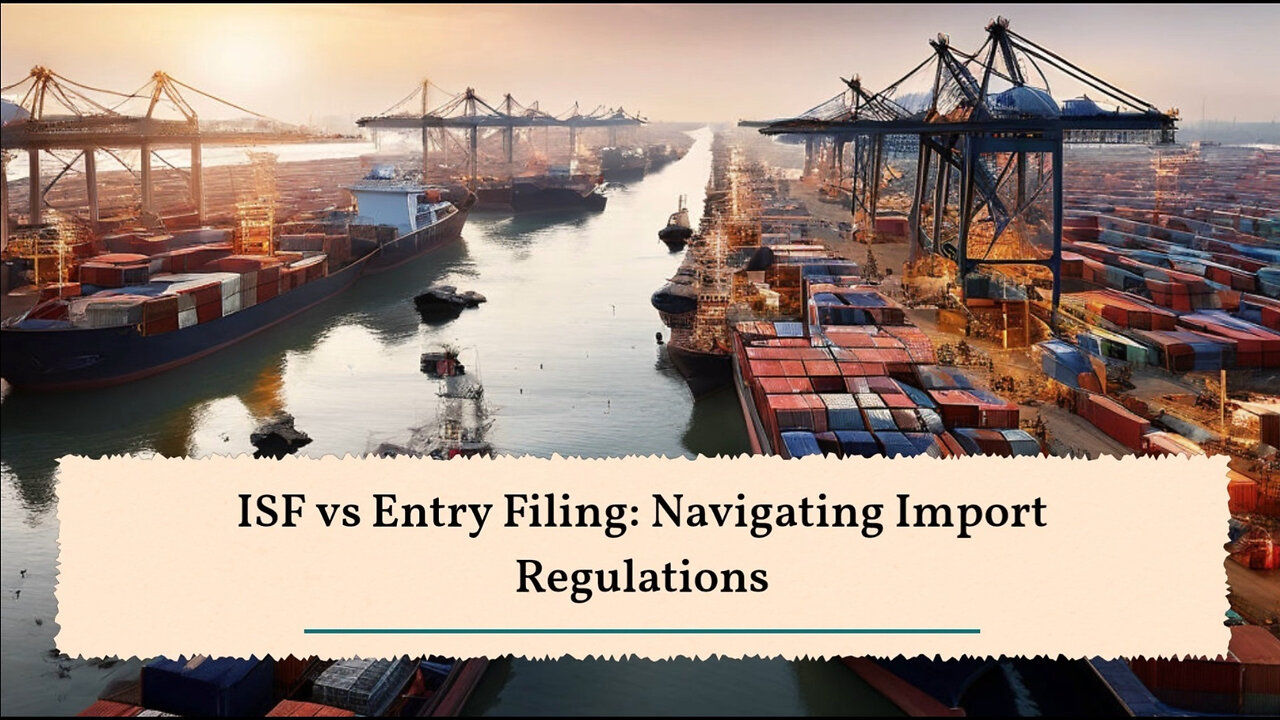Premium Only Content

Mastering ISF Filing and Entry Filing: The Key to Import Compliance Success!
ISF Depot // 661-246-8217 // customs@isfdepot.com // www.isfdepot.com
In today's video, we will be discussing two important concepts in customs brokerage: ISF Filing and Entry Filing. ISF Filing, or Importer Security Filing, is a mandatory requirement enforced by US Customs and Border Protection (CBP) for all cargo entering the United States by ocean vessel. It involves providing advance information on the shipment before it arrives at the port of entry. The purpose of ISF is to enhance border security and improve risk assessment capabilities for incoming cargo. Failure to comply with ISF regulations can result in penalties, delays, and denial of entry for the cargo.
On the other hand, Entry Filing is the formal process of declaring the imported goods to CBP. It includes submitting documentation and paying the applicable duties, taxes, and fees. An entry must be filed for each import shipment unless exempted by specific regulations. Entry Filing requires providing detailed information about the imported goods, such as the Harmonized System (HS) classification, country of origin, value, quantity, and any applicable trade agreements or special programs. Customs brokers, who act as intermediaries between importers and CBP, typically handle Entry Filing.
The main difference between ISF Filing and Entry Filing lies in the timing and specific information required. ISF Filing focuses on providing advance information about the cargo, while Entry Filing is the formal declaration submitted after the goods have arrived in the United States. Both ISF Filing and Entry Filing are crucial for import compliance as they enable CBP to assess security risks and determine the admissibility, correct tariff classification, and amount of duty owed for the imported goods.
Importers should ensure accurate and timely filings for both ISF and Entry to avoid compliance issues, penalties, and delays. Utilizing the expertise and knowledge of customs brokers can facilitate the smooth entry of goods into the country. We hope this information has provided you with a better understanding of ISF Filing and Entry Filing in the field of customs brokerage. Stay tuned for more informative videos on customs brokerage and international trade. Thank you for watching, and don't forget to like, share, and subscribe to our channel for upcoming content.
#usimportbond #isfcustomsbroker #uscustomsclearing #isfentry
Video Disclaimer Here: This tutorial is independent and not affiliated with any US governmental entities.
00:24 - ISF Filing is a mandatory requirement by U.S. Customs and Border Protection for all cargo entering the United States by ocean vessel, providing advance information on the shipment before arrival.
00:48 - ISF Filing aims to enhance border security and improve risk assessment capabilities, requiring importers to submit comprehensive information about the cargo at least 24 hours before the vessel departs from the foreign port.
01:26 - Entry Filing is the formal process of declaring imported goods to CBP, involving submitting documentation, paying applicable duties, taxes, and fees, and providing detailed information about the goods to determine admissibility and duty owed.
02:22 - The main difference between ISF Filing and Entry Filing is the timing and information required, with ISF focusing on advance information and Entry Filing being the formal declaration submitted to CBP after goods have arrived in the U.S. Both are crucial for import compliance to avoid penalties, delays, and compliance issues.
-
 1:36:46
1:36:46
Kim Iversen
6 hours agoLee Harvey Oswald and Cuba: The New Evidence That Changes Everything
38.2K26 -
 2:19:43
2:19:43
TheSaltyCracker
4 hours agoCybertruck Bomber Manifesto Leaked ReeEEeE Stream 01-03-25
104K155 -
 1:44:12
1:44:12
Roseanne Barr
3 hours ago $8.32 earnedSquid Game? | The Roseanne Barr Podcast #81
46.9K24 -
 DVR
DVR
Man in America
8 hours ago🚨 2025 WARNING: Disaster Expert Predicts 'ABSOLUTE CHAOS' for America
10.9K12 -
 LIVE
LIVE
I_Came_With_Fire_Podcast
9 hours agoNew Years TERRORISM, Mexico trying to FAFO, and DARK MONEY to US Think Tanks
211 watching -
 1:47:40
1:47:40
Glenn Greenwald
6 hours agoThe Key Issues Determining the Trajectory of the Second Trump Administration: From Israel and Ukraine to Populism and Free Speech | SYSTEM UPDATE #382
58.7K35 -
 1:02:44
1:02:44
The StoneZONE with Roger Stone
3 hours agoRoger Stone Unveils His 16th Annual International Best and Worst Dressed List | The StoneZONE
24.6K3 -
 45:22
45:22
Kyle Rittenhouse Presents: Tactically Inappropriate
5 hours ago $2.45 earnedKyle Rittenhouse Presents: Tactically Inappropriate
26.1K14 -
 1:13:16
1:13:16
Patriots With Grit
4 hours agoThe Comedy of White Privilege & Government | A.J. Rice
16.5K1 -
 49:40
49:40
Havoc
8 hours agoWhat's 2025 Looking Like... | Stuck Off the Realness Ep. 23
40.1K2